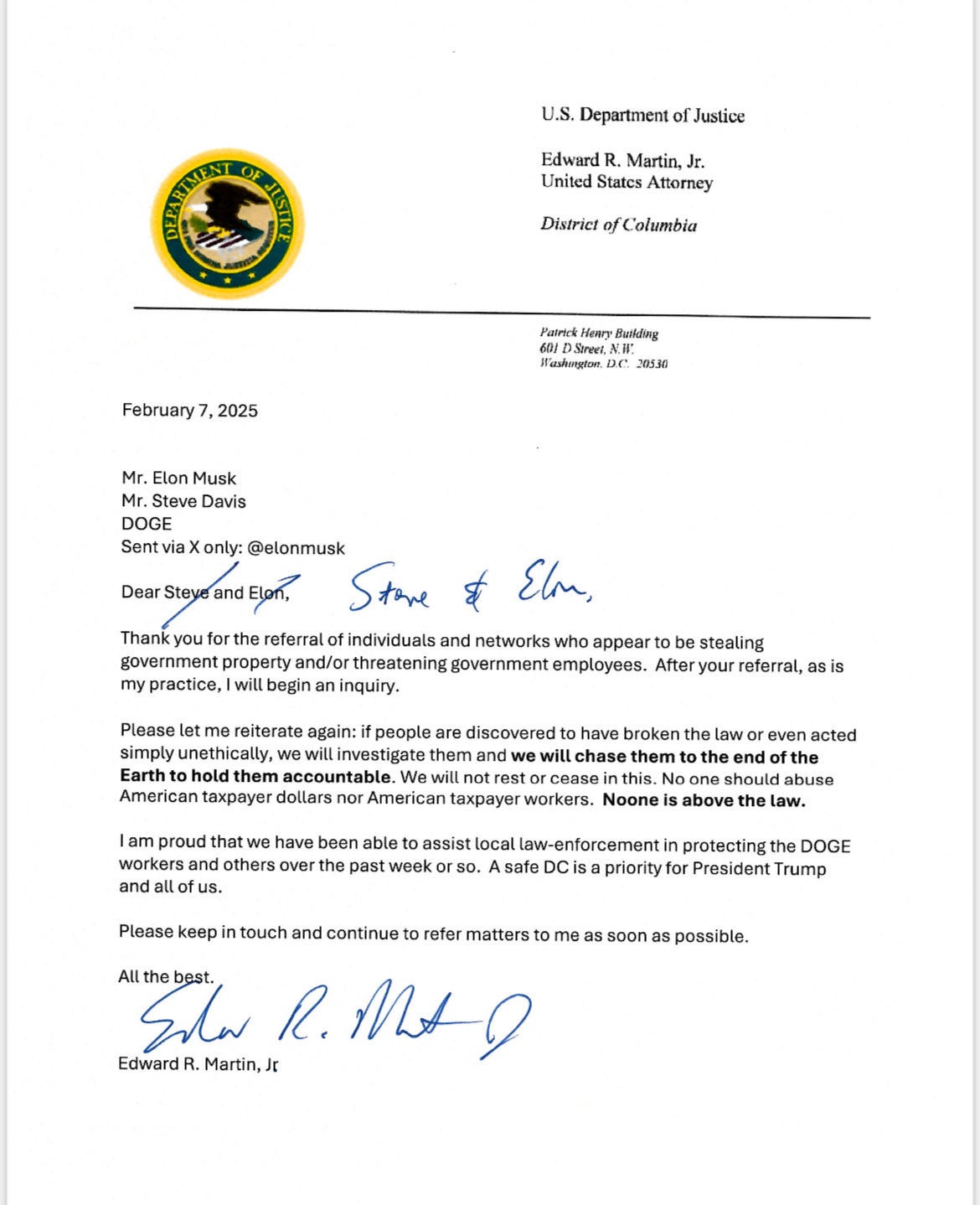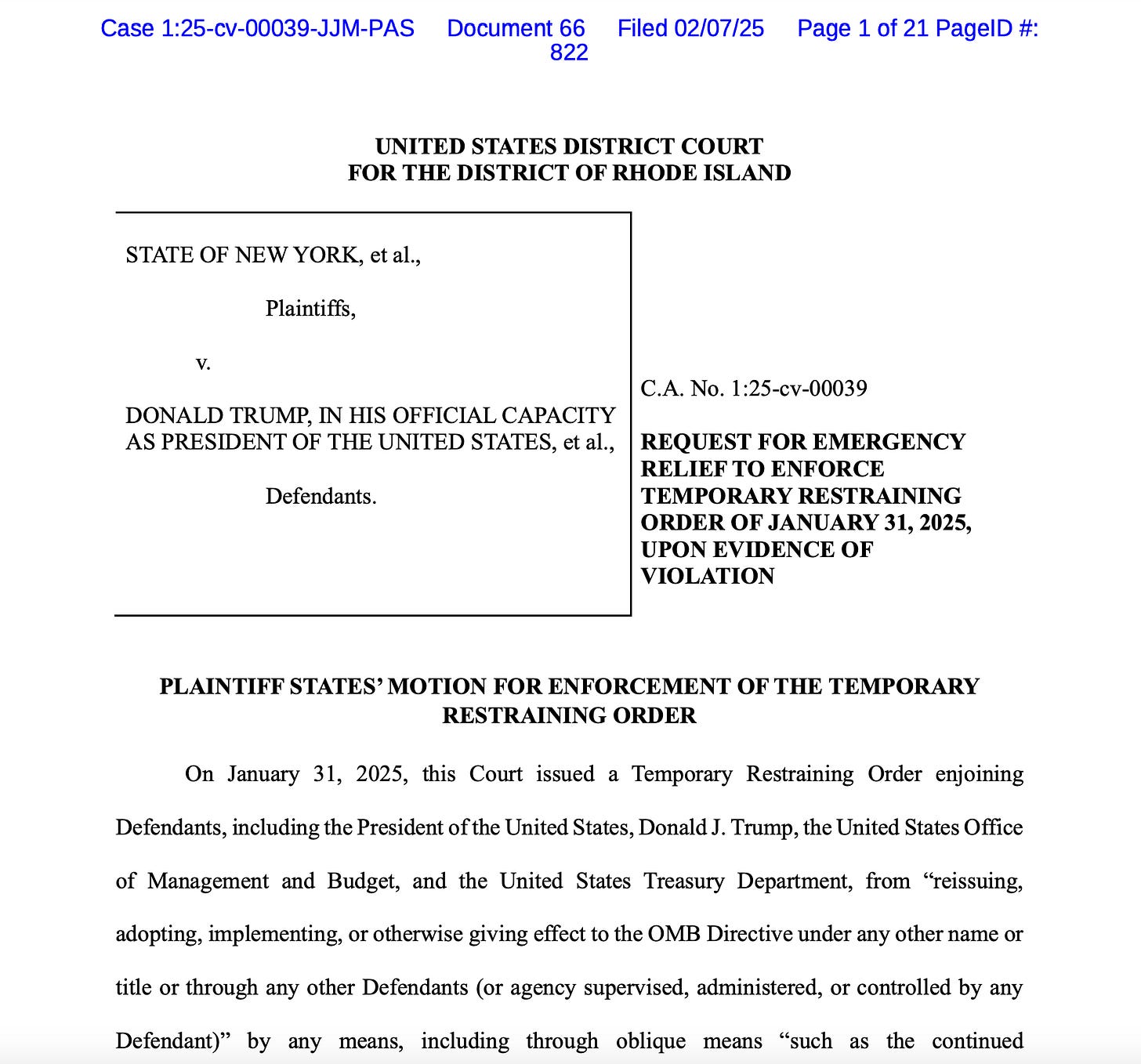Coup, Continued
(But the rule of law is pushing back.)
As we end this week, there are lawsuits. Lawsuits everywhere, challenging just about everything Donald Trump is trying to do that exceeds the bounds of lawful presidential power. The question is, will it be enough? Will the lawsuits work? Will the courts hold?
There is reason to be deeply concerned about Trump’s Justice Department under new Attorney General Pam Bondi. Bondi unleashed a barrage of memos on her first day in office that made key changes to how DOJ operates. They ran the gamut from creating a “Weaponization Working Group” that will investigate the Trump investigators, to prioritizing federal death penalty cases. There were 14 memos in all. We’ll learn more about what each one does as Pam Bondi’s DOJ gets to work, but one that jumps out involves disbanding TaskForce Klepto Capture, which, in its two years of existence, led to almost $700 million in assets being seized to enforce sanctions and restrictions against Russia following the invasion of Ukraine. On day two on the job, Bondi filed lawsuits against Illinois’ governor, Chicago’s mayor, and other officials, challenging that state’s ability to operate sanctuary cities. Between the memos and the lawsuits, that’s a lot to read, let alone understand. So it’s impressive that Bondi also found time to do an exclusive interview with Sean Hannity on Fox News during her second day on the job, with the White House as her backdrop.
Bondi is entitled to make these policy changes. We may disagree with them, and they may be the subject of vigorous debate, but they are within her legal authority. She’s also entitled to file lawsuits like the ones she did in Illinois. The law isn’t entirely clear, and she may gain some ground in Trump’s battle to impose austere anti-immigrant policies, although Illinois has strong arguments to support its position. The courts will decide the outcome.
The problem is the rest of it. The conduct that teeters outside the bounds of lawfulness and that demonstrates that the country’s new president is testing both the limits of his power and what he can get away with, waiting to see if anyone—courts or voters, since the Republican-led Senate seems to be firmly invested in looking the other way—will set some boundaries.
D.C. U.S. Attorney
Then there is Ed Martin, Trump’s interim U.S. Attorney in the District of Columbia. He was back on Twitter, flirting with Elon Musk in a manner that is inconsistent with the prosecutor’s motto, without fear or favor.
This is the second time Martin has posted a letter to Musk on Twitter, this time with an odd Tweet that said “Sent only via X,” as though portending the use of X as the sole means for government communications. I don’t want to overread that, but it bears watching. Martin’s attached letter violates DOJ policy by publicly discussing criminal case referrals to his office and saying he is opening cases, both actions prohibited by the Federal Principles of Federal Prosecution.
Perhaps if, as he claims in his letter, Martin is going to chase people to the ends of the earth for “even acting simply unethically,” he should start close to home, where there is plenty of suspicious conduct underway in his district.
Martin would be facing internal discipline in any other administration. It’s unlikely we will see that happen here, unless a court intervenes down the road if his conduct prejudices one of the office’s cases.
FBI Lawsuits
For now, Trump's DOJ has agreed not to make the names of FBI agents involved in the January 6 investigation and Trump investigations public, pending the outcome of two lawsuits. One is a class action, and if the court were to permit that could go forward, it could bring in all of the agents who’ve been subject to this action. Typically, when the government says through its lawyers at the Justice Department that it will or won’t do something, their word is their bond. Here, there is still concern about leaks. The agreement requires the FBI to give two days' advance notice if their plans change, so the affected agents will have the opportunity to go back to court.
You can read the order in that case here.
USAID
Judge Carl Nichols is the Trump appointee to the federal bench who ruled in favor of January 6 defendants, saying they couldn’t be charged with obstructing Congress, because the statute DOJ used was limited to obstruction by tampering with documents. That was a minority view among the judges on his court, but it was the one that the Supreme Court ultimately adopted in Miller v. U.S. Many lawyers in the District who have appeared in front of him say he is a good and fair judge.
Interestingly, his decision in Miller appears to be the hook Pam Bondi’s DOJ will use to investigate former special counsel Jack Smith’s team of prosecutors. There has been some suggestion they believe prosecutors acted improperly by charging under the statute, although even though federal judges were divided on the merits of the theory they used and a decision by the Supreme Court was ultimately necessary to resolve the issue.
Today, the case challenging Trump’s decision to close USAID landed in front of Judge Nichols. By the end of the day, he had temporarily blocked the plan to put some 2,200 of the agency’s roughly 10,000 employees onto paid leave, which means they have to stop working, in other words, for many of those abroad, stop delivering lifesaving food, medication, and treatment to people who rely on them. Judge Nichols also ordered the reinstatement of 500 employees who had been placed on administrative leave. You can read his order here. It is both limited and temporary.
Elon Musk’s claim over the weekend that he put the agency through a wood chipper may have been premature.
The Justice Department argued that this is just a bunch of personnel actions that they are legally entitled to take. It hits like the kind of argument you can already hear them making in front of the Supreme Court to justify action by the president. “No, Justice Alito, we were not disbanding the agency, which only Congress can do, we were just removing all of its employees from service.”
DOJ told Judge Nichols during today’s hearing that they are trying to root out “corruption and fraud” in the agency. Too bad Trump didn’t just keep the Inspectors General, who he fired in violation of law last week, in place—because that’s their job. They’re the folks who go after corruption, fraud, and waste. And, in any event, it strains credulity to believe Musk and his boys could have found such conclusive evidence of rampant corruption in just a few days that shutting down an entire agency that does so much good was justified.
One of the most poignant moments in the hearing came when Karla Gilbride, who Trump just fired from her position as general counsel of the Equal Employment Opportunity Commission (EEOC) and who is representing plaintiffs in this case, explained to the Judge that for the people who work at USAID, it isn’t just a job, “It’s a calling.” She told him, “To stand by and watch children who are dying of malnutrition, not being able to provide medicines, having food spoil on shelves because it can’t be distributed, I think would cause some emotional injuries to these individuals.”
Judge Nichols’ order is just a temporary stay while the parties prepare to make substantive arguments to the court for one that would continue while the litigation proceeds.
The larger fear surrounding this case is that if Trump can do away with one government office that offends him, he’ll just keep going. It’s important to draw the line on the scope of presidential power and its limits here.
Impoundment
Even though a federal judge ordered the Trump administration to stop freezing congressionally allocated spending for a variety of programs, it appears that hasn’t happened, at least not completely. So, the plaintiffs in that case have asked the Judge to enforce the order in that case. This is the case involving the OMB memo that suspended spending and which the government said was withdrawn after the court entered its order.
In the Rhode Island case brought by 22 states and the District of Columbia, the plaintiffs argue that “there is no world in which these scattershot outages, which as of this writing impact billions of dollars in federal funding across the Plaintiff States, can constitute compliance with this Court’s Order,” and noted the situation had not improved in the week since the court entered its order. They concluded, “This Court should enforce the plain text of its temporary restraining order and order Defendants to immediately restore funds and desist from the federal funding pause until the preliminary injunction motion can be heard and decided, a process which is proceeding expeditiously in separate proceedings before this Court.”
DOGE: Student Loans and State AGs
More suits are being filed challenging DOGE’s operation. There is a new one today challenging access to student loans information. And a group of Democratic state AG’s weighed in with their powerful voices this afternoon to try and end DOGE’s access to Treasury’s central payment system.
In the Department of Labor case challenging DOGE, the judge has denied the plaintiffs’ request for a temporary restraining order. The ruling came because he didn’t believe they have standing to bring the case. It’s the first big loss for anti-DOGE litigants, but they can come back with different plaintiffs who are better able to argue they have standing to assert these claims.
I know that’s a lot on a Friday night, but I wanted to give you time to get caught up before more kicks in. We live in perilous times. It’s a quiet Friday night around here, and, as I wrote earlier this week, it doesn’t look like a coup. But there are dangerous changes taking shape in our democracy, with a president assuming powers long reserved to Congress and imperiling important information in the position of government agencies, as well as Americans’ personal information, as though he had a right to—which he doesn’t. It will be up to the courts to stop him in the short term and the voters at the midterm elections. That makes staying informed more important than it has ever been.
Thanks for being here.
We’re in this together,
Joyce






Turns out, gutting agencies, firing watchdogs, and stretching executive power past its breaking point makes for a very busy first month. But for every overreach, there’s a lawsuit. And for every lawsuit, there’s another chance to expose the fragility of Trump’s legal arguments. They may have a plan, but so do the courts—and so do the people who refuse to let democracy slide without a fight
For me the most chilling moment in reading your column was the weirdly public letter from Martin to Musk. Here’s this AG “palling around” with and disclosing information to someone who is clearly breaking the law. And instead of protecting we the people he’s patting himself on the back for his fierce protection of the law-breakers. This is a kind of mass gaslighting. One comes away from that letter feeling oddly crazy. And deeply disturbed.